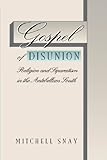Gospel of disunion : religion and separatism in the antebellum South / Mitchell Snay.
Material type: TextPublication details: Chapel Hill, NC : University of North Carolina Press, 1997.Description: xi, 265 p. ; 23 cmISBN:
TextPublication details: Chapel Hill, NC : University of North Carolina Press, 1997.Description: xi, 265 p. ; 23 cmISBN: - 0807846872 (alk. paper)
- 9780807846872 (alk. paper)
- 277.5081 21
- BR 535 S669g 1997
| Item type | Current library | Home library | Collection | Shelving location | Call number | Copy number | Status | Date due | Barcode |
|---|---|---|---|---|---|---|---|---|---|
 Libro
Libro
|
Biblioteca Juan Bosch | Biblioteca Juan Bosch | Humanidades | Humanidades (4to. Piso) | BR 535 S669g 1997 (Browse shelf(Opens below)) | 1 | Available | 00000069381 |
Browsing Biblioteca Juan Bosch shelves, Shelving location: Humanidades (4to. Piso), Collection: Humanidades Close shelf browser (Hides shelf browser)

|

|
No cover image available |

|
No cover image available |

|

|
||
| BR 526 W214g 2005 God's politics : why the right gets it wrong and the left doesn't get it / | BR 526 Z21r 2007 Religion and politics in America : the rise of Christian evangelists and their impact / | BR 535 C147a 1968 A la sombra del campanario / | BR 535 S669g 1997 Gospel of disunion : religion and separatism in the antebellum South / | BR 563 B136l 2006 Latinos and the new immigrant church / | BR 563.4 C699d 1998 Daughters of thunder : Black women preachers and their sermons, 1850-1979 / | BR 563.4 C699j 2010 Jesus, jobs, and justice : African American women and religion / |
Originally published: New York : Cambridge University Press, 1993.
Includes bibliographical references (p. 219-259) and index.
Cover; Contents; Acknowledgments; Introduction: Religion and the search for Southern distinctiveness; PART ONE: RELIGION AND SECTIONAL POLITICS; 1. The abolitionist crisis of 1835: The issues defined; PART TWO: RELIGION AND SLAVERY; 2. Slavery defended: The morality of slavery and the infidelity of abolitionism; 3. Slavery sanctified: The slaveholding ethic and the religious mission to the slaves; PART THREE: RELIGION AND SEPARATISM; 4. Harbingers of disunion: The denominational schisms; 5. The religious logic of secession; 6. Religion and the formation of a Southern national ideology. Conclusion: Religion, the origins of Southern nationalism, and the coming of the Civil WarBibliography; Index; A; B; C; D; E; F; G; H; I; J; K; L; M; N; O; P; Q; R; S; T; U; V; W; Y.
The centrality of religion in the life of the Old South, the strongly religious nature of the sectional controversy over slavery, and the close affinity between religion and antebellum American nationalism - all point toward the need to explore the role of religion in the development of Southern sectionalism. This book examines the various ways in which religion adapted to and influenced the development of a distinctive Southern culture and politics before the Civil War, adding depth and form to the movement that culminated in secession.


There are no comments on this title.